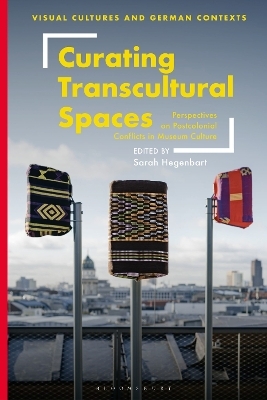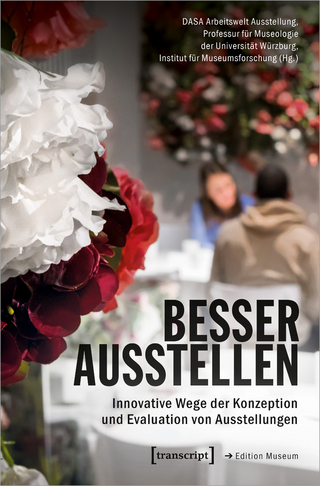
Curating Transcultural Spaces
Bloomsbury Visual Arts (Verlag)
978-1-350-22772-9 (ISBN)
This volume, an indispensable source for the process of engaging with colonial history in Germany and beyond, takes its starting point from the 'scandal' of the Humboldt Forum. The transfer of German state collections from the Ethnological Museum and the Museum for Asian Art, located at the margins of Berlin in Dahlem, into the centre of Germany's capital indicates the nation’s aspiration of purported multiculturalism and cosmopolitanism; yet the project’s resurrection of the site’s former Prussian city palace, which was demolished during the GDR, stands in opposition to its very mission, given that the Prussian rulers benefited from colonial exploitation. By examining the contrasting successes of other projects, such as the National Museum of African American History and Culture in Washington DC, Curating Transcultural Spaces compellingly argues for the necessity of taking post-colonial thinking on board in the construction of museum spaces in order to generate genuine exchange between multiple perspectives.
Sarah Hegenbart is a Lecturer in Art History at Technical University Munich, Germany. Prior to this, she worked as an Associate Lecturer at the Courtauld Institute, where she also undertook her doctoral research, and as Curator of Art at Pembroke College, UK. She has also worked in the cultural section at the German Embassy in London, after completing an M.St. in Ancient Philosophy at the University of Oxford and a Magister in Philosophy and History of Art at the Humboldt University of Berlin.
List of Illustrations
Notes on Contributors
Acknowledgements
Preface: Positionality Statement
1. Introduction: Collaborating cultures, negotiating identities, Sarah Hegenbart (Technical University Munich, Germany)
Part One: Curating Transcultural Spaces
2. Initial Legal and Policy Questions Surrounding Objects Dispossessed in Colonial Context, Kwame Opoku (previously, United Nations Office in Vienna, Austria)
3. Symptoms of postcolonial aporia and (national) identity crises in Germany (Sarah Hegenbart Technical University Munich, Germany)
4. Multiple Modernisms – curating the postwar era for the present, Kristian Handberg (University of Copenhagen, Denmark)
Part Two: Confronting the colonial past and constructing identities on the African continent
5. The Architecture and Aesthetics of Apartheid: Dada in South Africa, a Case Study, Thomas Haakenson (California College of the Arts in San Francisco, California, USA)
6. Contested Memories and Spaces: Art, Archives, and Ambivalence in ‘Ovizire · Somgu: From Where Do We Speak’, a case study from Namibia, Julia Rensing (University of Basel, Switzerland)
7. Democracy reflected in Form Space and Order: Learning from West Africa’s Ancient Empires, a Case Study from Nigeria, Olajumoke Adenowo (Architect, AD Consulting, Nigeria)
8. Westerns made in Africa, a Case Study from Burkina Faso, Camille Varenne (Filmmaker, Independent, France)
Part Three: Post-Colonial Conflicts, colonial memories and negotiating identities in Germany
9. Troubling the Nation: Black Germans and the Teaching of History, Jeff Bowersox (University College London, UK)
10. The African Diaspora Palace: The Pastfuture of Black Knowledge in Europe, Natasha A. Kelly (Filmmaker, Artist, Author, Berlin, Germany)
11. Cosmopolitanizing Colonial Memories in Berlin: The Humboldt Forum and the current Shift in Germany’s Culture of Remembrance, Thomas Thiemeyer (The University of Tübingen, Germany)
12. Under the shadow of the Christian cross: visions, delusions, and national Realpolitik. Whose concepts will be seen, whose voices can be heard behind the coat of baroque facades inside a faked Prussian palace?, Viola Konig (Freie Universität Berlin, Germany)
Conclusion
Index
| Erscheinungsdatum | 27.01.2024 |
|---|---|
| Reihe/Serie | Visual Cultures and German Contexts |
| Zusatzinfo | 78 bw illus |
| Verlagsort | London |
| Sprache | englisch |
| Maße | 156 x 234 mm |
| Themenwelt | Kunst / Musik / Theater ► Kunstgeschichte / Kunststile |
| Geisteswissenschaften ► Geschichte ► Hilfswissenschaften | |
| Geisteswissenschaften ► Geschichte ► Regional- / Ländergeschichte | |
| ISBN-10 | 1-350-22772-2 / 1350227722 |
| ISBN-13 | 978-1-350-22772-9 / 9781350227729 |
| Zustand | Neuware |
| Informationen gemäß Produktsicherheitsverordnung (GPSR) | |
| Haben Sie eine Frage zum Produkt? |
aus dem Bereich


